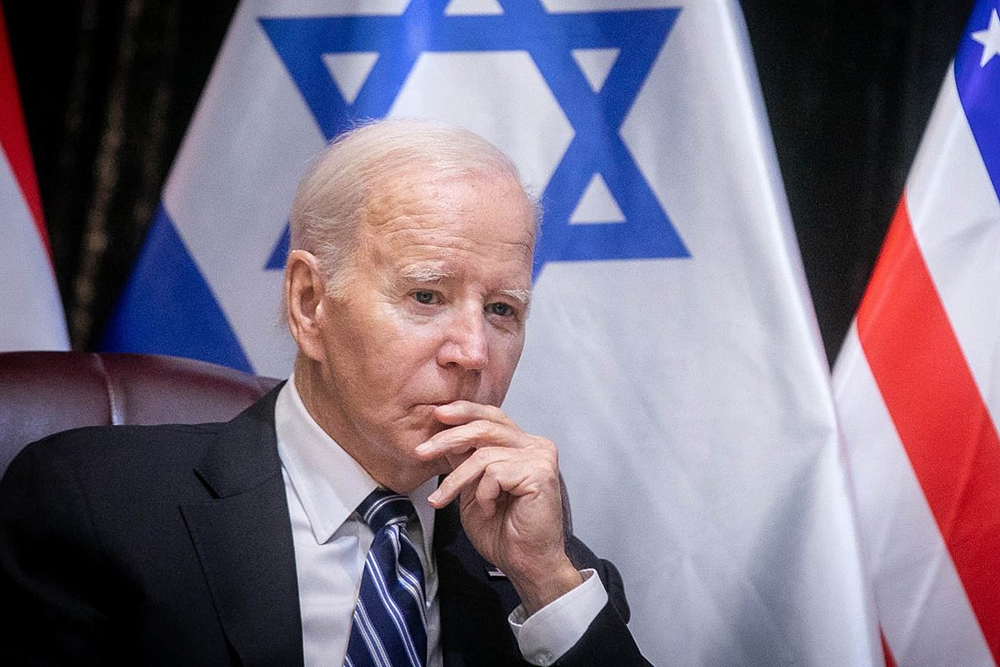|
Getting your Trinity Audio player ready...
|
Edited by: TJVNews.com
President Biden’s recent actions regarding Israel raise serious concerns, particularly at a crucial juncture when Israel is striving to make significant progress in addressing security threats and hostage situations. The decision to send negotiators to Paris for hostage talks comes after sustained pressure from the White House, signaling a willingness to engage in diplomatic efforts.
While there is hope for progress in the negotiations, the path ahead is fraught with challenges, as Israeli officials have rightly expressed cautious optimism while acknowledging the arduous nature of the negotiations. However, the effectiveness of these negotiations is jeopardized by the apparent eagerness of the Biden administration to offer concessions to Hamas, thereby diminishing incentives for the terrorist organization to engage in meaningful dialogue.
The United States’ veto of a UN Security Council resolution calling for an immediate cease-fire in Gaza, coupled with its opposition to an Israeli ground attack on the city of Rafah, sends mixed signals and raises questions about the administration’s commitment to Israel’s security. By undermining Israel’s efforts to combat Hamas and safeguard its citizens, the Biden administration risks emboldening terrorist elements and prolonging the cycle of violence in the region.
Furthermore, any temporary cease-fire would only provide Hamas with breathing room to regroup, rearm, and continue its campaign of terror against innocent civilians. The imperative for Israel to dismantle Hamas’s remaining infrastructure in Gaza, particularly in Rafah, is clear and pressing in order to prevent further attacks and secure the release of hostages.
The pressure on Israel not to launch a ground attack on Rafah, a known hub for arms smuggling, disregards the immediate security needs of the region. Controlling Rafah is crucial for preventing the smuggling of weapons, including missiles capable of hitting Tel Aviv, into the hands of Hamas
The veto of the UN resolution diminishes the incentives for Hamas to engage in meaningful negotiations, as the terrorist organization might perceive it as a reward for its actions. The simultaneous push for a U.S.-initiated cease-fire plan and opposition to Israeli military actions undermine Israel’s ability to decisively address the threat posed by Hamas.
The eagerness to push for a cease-fire and oppose crucial military operations against Hamas raises questions about the administration’s priorities and its understanding of the security challenges faced by Israel.
The insistence on a “two-state solution” is another point of contention, especially considering the rejection of this notion by the Israeli Cabinet and limited support from the Israeli public. This approach appears detached from the ground reality and the security concerns that Israel faces, particularly after the October 7th terrorist attack.
For a lasting and meaningful peace, it is crucial for the Biden administration to reassess its approach, align its actions with its promises of support for Israel, and prioritize the security and well-being of the region. Only through a clear and unwavering commitment to Israel’s security can the United States contribute positively to the resolution of the Israeli-Palestinian conflict.
In light of these developments, the Biden administration must reassess its approach and prioritize the security interests of its ally, Israel. By standing firm against terrorism and supporting Israel’s right to defend itself, the United States can contribute to stability and peace in the region while advancing its broader foreign policy objectives. Any actions that undermine Israel’s security and empower terrorist groups like Hamas are not only counterproductive but also morally reprehensible.




